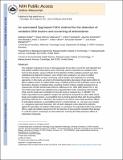An automated Fpg-based FADU method for the detection of oxidative DNA lesions and screening of antioxidants
Author(s)
Moreno-Villanueva, Maria; Fischbach, Arthur; Martello, Rita; Dedon, Peter C.; Ullrich, Volker; Mangerich, Aswin; Muller, Nathalie; Kienhofer, Joachim; Burkle, Alexander; ... Show more Show less
DownloadDedon_An automated FPG.pdf (1.919Mb)
PUBLISHER_CC
Publisher with Creative Commons License
Creative Commons Attribution
Terms of use
Metadata
Show full item recordAbstract
The oxidation of guanine to 8-oxo-2′-deoxyguanosine (8-oxo-dG) is one of the most abundant and best studied oxidative DNA lesions and is commonly used as a biomarker for oxidative stress. Over the last decades, various methods for the detection of DNA oxidation products have been established and optimized. However, some of them lack sensitivity or are prone to artifact formation, while others are time-consuming, which hampers their application in screening approaches. In this study, we present a formamidopyrimidine glycosylase (Fpg)-based method to detect oxidative lesions in isolated DNA using a modified protocol of the automated version of the fluorimetric detection of alkaline DNA unwinding (FADU) method, initially developed for the measurement of DNA strand breaks (Moreno-Villanueva et al., 2009. BMC Biotechnol. 9, 39). The FADU-Fpg method was validated using a plasmid DNA model, mimicking mitochondrial DNA, and the results were correlated to 8-oxo-dG levels as measured by LC–MS/MS. The FADU-Fpg method can be applied to analyze the potential of compounds to induce DNA strand breaks and oxidative lesions, as exemplified here by treating plasmid DNA with the peroxynitrite-generating molecule Sin-1. Moreover, this method can be used to screen DNA-protective effects of antioxidant substances, as exemplified here for a small-molecule, i.e., uric acid, and a protein, i.e., manganese superoxide dismutase, both of which displayed a dose-dependent protection against the generation of oxidative DNA lesions. In conclusion, the automated FADU-Fpg method offers a rapid and reliable measurement for the detection of peroxynitrite-mediated DNA damage in a cell-free system, rendering it an ideal method for screening the DNA-protective effects of antioxidant compounds.
Date issued
2013-05Department
Massachusetts Institute of Technology. Center for Environmental Health Sciences; Massachusetts Institute of Technology. Department of Biological EngineeringJournal
Toxicology
Publisher
Elsevier
Citation
Muller, Nathalie, Maria Moreno-Villanueva, Arthur Fischbach, Joachim Kienhofer, Rita Martello, Peter C. Dedon, Volker Ullrich, Alexander Burkle, and Aswin Mangerich. “An Automated Fpg-Based FADU Method for the Detection of Oxidative DNA Lesions and Screening of Antioxidants.” Toxicology 310 (August 2013): 15–21.
Version: Author's final manuscript
ISSN
0300483X